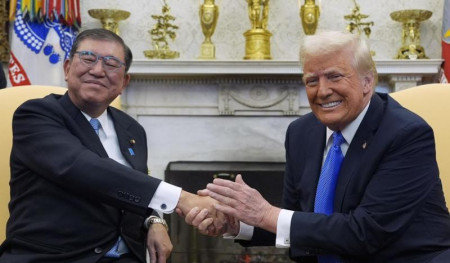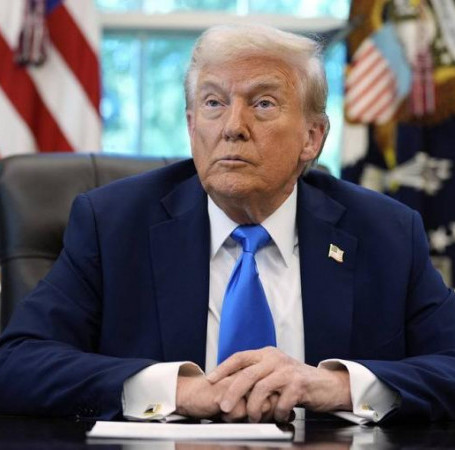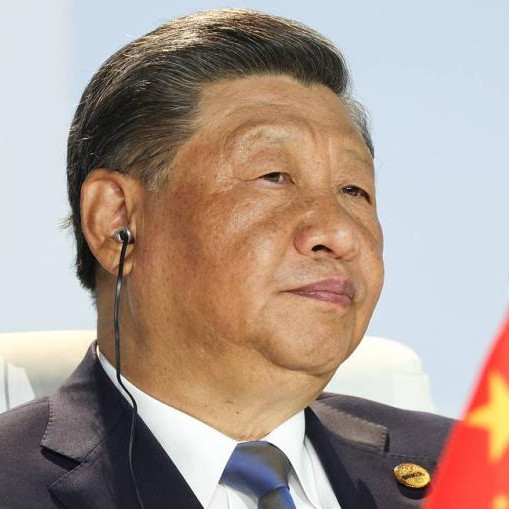
US President Donald Trump and Japanese Prime Minister Shigeru Ishiba have agreed to ensure by all means available that a "golden age" begins in bilateral relations, as evidenced by the final communique of their Washington summit. Trump loves gold, his skyscrapers are painted gold, and the glitter of interiors in his residence hurts everyone else’s eyes. In his inaugural address, he also spoke about the beginning of the "golden age of America." The Japanese, who had been more meticulous than ever in preparing Ishiba’s visit decided to hop to it as well. Their gifts were rich and numerous.
First, during negotiations and media briefings, Ishiba said Tokyo would make the volume of Japanese investments in the United States reach $1 trillion. With the air of a seasoned Santa Claus, he also announced a decision to build an Isuzu car factory in the United States, with similar Toyota projects coming soon.
At the same time, he said the Japanese Nippon Steel company was abandoning plans to buy the industry's flagship US Steel, as Trump demanded, but would invest a fair amount in its production. The money to bring the company out of crisis will be Japanese, but the pride of the American industry itself is going to be left in the hands of the United States.
Second, the Japanese Prime Minister announced massive purchases of American liquefied natural gas, lambasting Biden for bans in the area. Tokyo seems not really bothered by the fact that the price of gas in the Asian market is always higher than in Europe, experts from the Gas Exporting Countries Forum (GECF) noted in their December review. And price growth forecast over terminated Russian pipeline transit in 2025 has proven correct. The import of American LNG has crippled the German economy’s export sector, because domestic gas prices in Germany and the United States differ by three times. For Japan, this gap will be even bigger.
Third, Trump, who has repeatedly urged NATO allies to allocate 5 percent of their GDP to defense instead of the current 2 percent, said he hoped Japan would increase military spending, but did not specify by how much. In turn, Ishiba said Japan would make the decision "on its own initiative." In the meantime, Tokyo has been aiming to reach 2 percent by 2027. However, where the money should come from is still unclear. And the Ishiba Cabinet, having lost majority support in parliament in the fall, does not seem capable of raising defense expenditures. And let's not forget that Japan covers all the costs for maintaining American military bases in its territory out of its own pocket.
All these three points in a concentrated way illustrate what Trump wants from the outside world, primarily his closest allies. They have to invest in US economy, buy American and pay for US protection from enemies and competitors.
But that's not the whole story. Another thing Trump wants is justice, monetarily.
The United States has a $68 billion trade deficit with Japan. Having opened the talks at the White House, the American president stressed he did not rule out tariffs against Japan, but believed the issue could be resolved without punitive measures. "I think it will be very easy for Japan, we have a fantastic relationship I don’t think we’ll have any problem. They want fairness also." Ishiba’s face hardened into stone at the moment.
The point is that Japan has already got it in the neck because of Trump’s prohibitive import tariffs imposed against Canada and Mexico. The latter is home to about 10 factories of all Japan’s major car manufacturers — Toyota, Nissan, etc. Using cheap labor and preferences under the North American free trade area, they exported all their products to the United States. Customs statistics depict this like Mexican exports to the United States, but now those are subject to 25 percent tariffs. The only alternative is to shift production to the USA.
Any further increase in tariffs across the board in trade seems exactly what the Japanese have been taking pains to avoid. According to the World Bank, Japan's economic growth in 2024 will be 0.7 percent. This is 0.2 p/p lower than the January estimate. The local government believes that GDP growth is expected to reach 0.9 percent as per last year. In the third quarter of 2024, the figure rose by 0.3 percent year-on-year. Japan has been consistently losing its position in global economy over the past few years, teetering on the brink of stagnation. Trump's trade policy may well lead to an economic downturn in that country, with political responsibility to fall on Ishiba, though he seems hardly able to affect things a lot altogether.
When preparing for the meeting, government officials were extremely wary of Trump's mind-blowing initiatives. Just before the summit, he shocked the world with his statement of unthinkable plans to create an epoch-making resort on the ruins of Gaza, rejecting all the UN decisions on Palestine.
A representative of the Prime Minister's office said that "the same thing could happen at a press conference with Japan. We have no choice but to take the risk because [Trump] is completely unpredictable," Asahi writes.
Japan has no way out, indeed.
The country is seriously concerned about the rise of China. At the same time, the trigger of the Sino-Japanese conflict may be Beijing's claims to the Senkaku Islands, over which Japan established administrative control after the war. In this regard, after the visit of the Japanese PM, Trump confirmed that the United States would activate Article 5 of the Japan-US security treaty if China decides to change the archipelago’s status quo. Other presidents had pledged the same earlier, but Tokyo decided to play it safe — Trump is Trump, after all.
The parties also agreed to cooperate on the Taiwan issue, since Tokyo is extremely concerned about any potential engagement in the conflict over the island. They also mentioned cooperation on total denuclearization of North Korea, which is also one of Japan's top security priorities. However, Trump reminded that he had a great relationship with Kim Jong-un. Statements of the kind have stimulated suspicions in Tokyo that Washington may compromise with Pyongyang on denuclearization and its missile program.
Japan's security and economic well-being now entirely depend on the United States, and things being what they are, Tokyo clearly hoped for a miracle that Ishiba would be able to repeat the success of his predecessor Shinzo Abe, who visited Trump in the United States right after his first election victory in 2016 and managed to establish informal personal relations while playing golf. As the classics taught, where there is no love, talking about money is pointless. And the Japanese Prime Minister has publicly admired Trump's courage during assassination attempt, assuring him that his election victory is welcome in Japan and praising him for sincerity and lack of aggression, despite the brutal TV image.
But it didn't help. Trump smiled wryly at the clumsy compliments and even forgot to say goodbye to Ishiba after their joint press conference. “And still, they never dropped formalities," the Yomiuri newspaper stated.


